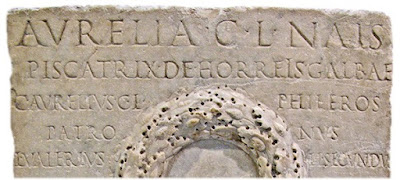AVRELIA C[ai] L[iberta] NAIS
PISCATRIX DE HORREIS GALBAE
C[aius] AVRELIVS C[ai] L[ibertus] PHILEROS
PATRONVS
L[ucius] VALERIVS L[uci] L[ibertus] SECVNDVS
[hoc monumentum fecerunt]
[1] Aurelia Nais was a freedwoman: L [iberta]
[2] She was a fish seller: PISCATRIX; piscātrīx, piscātricis [3/f]: fisherwoman, but she sold fish because the tombstone tells us where she worked:
DE HORREIS GALBAE: from the Horrea Galbae, which were warehouses in the southern part of Rome
https://www.digitalaugustanrome.org/records/horrea-galbana/
horreum, -ī [2/n] warehouse
[3] 2 men arranged for the construction of the tomb:
[i] Gaius Aurelius Phileros; he was her patronus [patrōnus, -ī (2/m)], her patron / protector. He was the one who freed her, but Phileros himself had previously been a slave: L [ibertus].
[ii] Lucius Valerius Secundus, also a former slave: [L]ibertus; his relationship to the deceased woman is unknown
The end statement – hoc monumentum fēcērunt – is not inscribed, but is implied by the existence of the names of the two men i.e. they made / arranged for this monument.
The names of all three people mentioned on the tombstone are interesting from the perspective of slaves and those who were freed.
[1] We’ll start with Gaius Aurelius │ Phileros: ‘Phileros’
is a cognōmen, a type of nickname: Phileros, Philerotos [3/m] is a Greek-type
noun meaning ‘full of love’ He was a slave but became a libertus, a freedman.
When that happened, a full formal name was given to him which included the name
of his master – Gaius Aurelius + his cognōmen.
C[aius] AVRELIVS ¦
C[ai] L[ibertus] ¦ PHILEROS │ Gaius Aurelius ¦ the freedman of Gaius ¦
Phileros
[2] When he became a freedman, Gaius Aurelius Phileros must
have done quite well for himself because he had a slave called Nais: Nais was
her cognōmen: Greek-type noun (water-nymph). She too was eventually given her
freedom and she took the name of her master, the former slave Gaius Aurelius
Phileros i.e. Aurelia Nais.
AVRELIA ¦ C[ai]
L[iberta] ¦ NAIS │ Aurelia ¦ freedwoman of Gaius ¦ Nais
[3] Lucius Valerius │ Secundus: he had been a slave to
Lucius Valerius, and, again, in addition to his cognōmen ‘Secundus’ he was
given the name of his former master.
L[ucius] VALERIVS ¦
L[uci] L[ibertus] ¦ SECVNDVS │ Lucius Valerius ¦ freedman of Lucius ¦
Secundus.
All three of them, therefore, were given formal names after
they were freed. The name of the former masters became the nōmen i.e. a
‘family’ name:
AURELIA Nais
GAIUS AURELIUS Phileros
LUCIUS VALERIUS Secundus



No comments:
Post a Comment